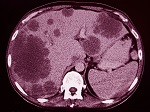
Of the hundreds of thousands of Americans who die from cancer each year, nearly all are victims of metastasis. That's when cancer cells leave the origin site and form tumors in other parts of the body. But in exciting preclinical trials, researchers have found a new target that could inhibit cancer metastasis.
For many years, researchers have tried but failed to interfere with cell signaling pathways that make it possible for cancer cells to move around the body. But in this new study working with animals that have metastasis, scientists found a molecule called four-hydroxyacetophenone or four-HAP. In the lab, it was able to significantly interfere with the metastasis of colon cancer cells.
That's because four-HAP interacts with a cell skeleton protein called non-muscle myosin-two or NM-two-C. NM-two-C controls how stiff the surface of cells becomes by affecting the proteins that determine the shape of the cell surface. By targeting this mechanism, scientists are manipulating the biomechanics of cells through altering the rigidity of cells and thus making it harder for these cancer cells to physically move and cause metastasis.
Now that we know NM-two-C is involved, it can be a target for new drugs and help cancer patients live longer or even survive cancer. The challenge is that cancer is more than two hundred different diseases, so the hope is that by attacking this basic cell function, we can inhibit multiple cancer types.
More Information
Ludwig Chicago study identifies a novel drug target for the control of cancer metastasis
Researchers led by Ludwig Chicago Co-director Ralph Weichselbaum and Ronald Rock of the University of Chicago have identified in preclinical studies a potential drug target for curtailing cancer metastasis.
New Drug Target for the Control of Cancer Metastasis Identified Using Mouse Model
Researchers led by Ludwig Chicago Co-director Ralph Weichselbaum and Ronald Rock of the University of Chicago recently published a study in the Proceedings of the National Academy of Sciences that describes how a compound named 4-hydroxyacetophenone (4-HAP) activates a specific protein motor in cells and so monkey-wrenches biomechanical processes essential to cell motility. It also demonstrates in a mouse model that targeting this protein motor undermines the metastasis of colon cancer cells.
4-Hydroxyacetophenone modulates the actomyosin cytoskeleton to reduce metastasis
There is a pressing need for new approaches to combat metastatic disease. We demonstrate, here, a strategy that targets and activates the molecular machines that control cell shape in cell division, wound healing, immune surveillance, embryonic development, and cancer metastasis.